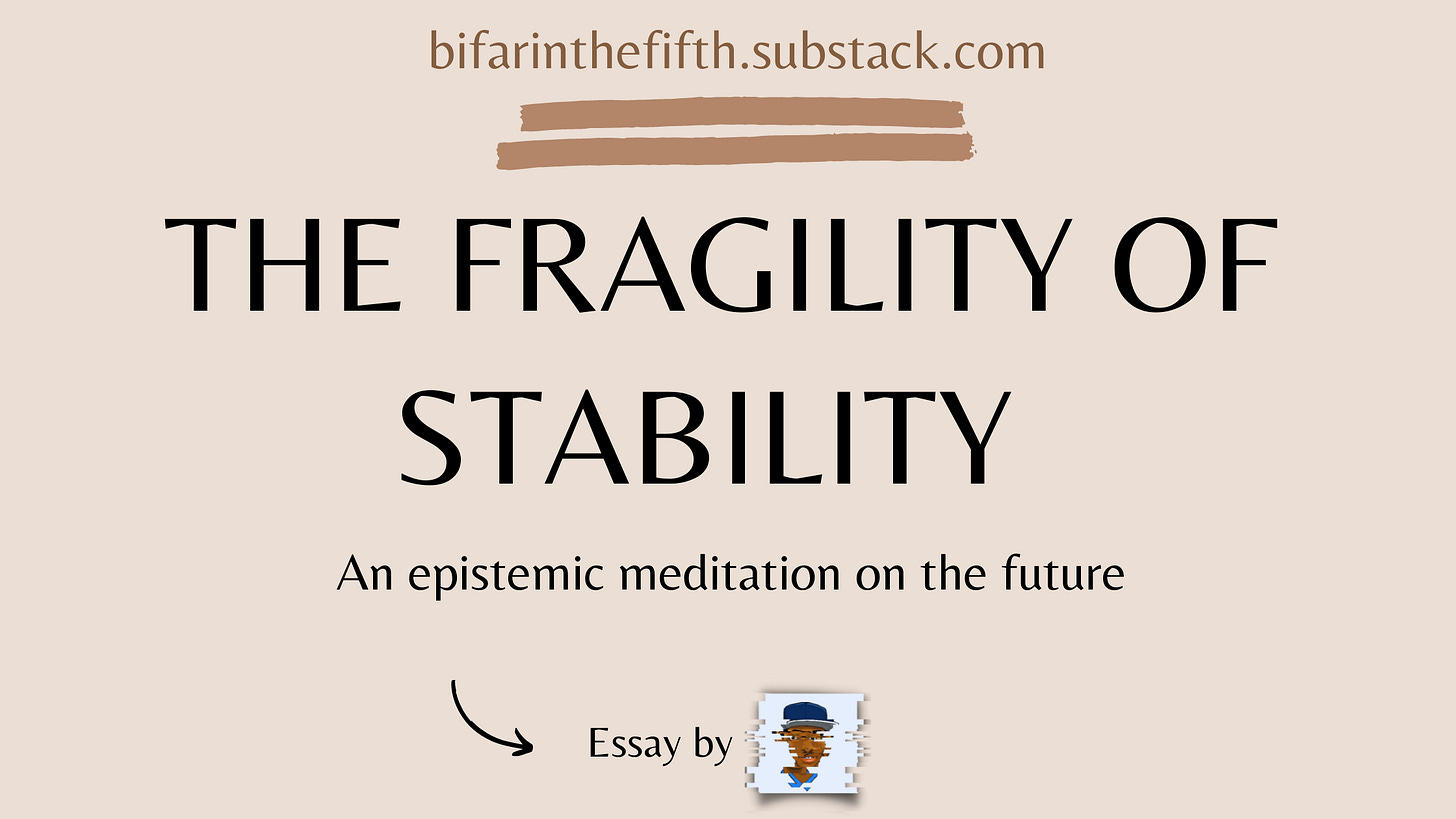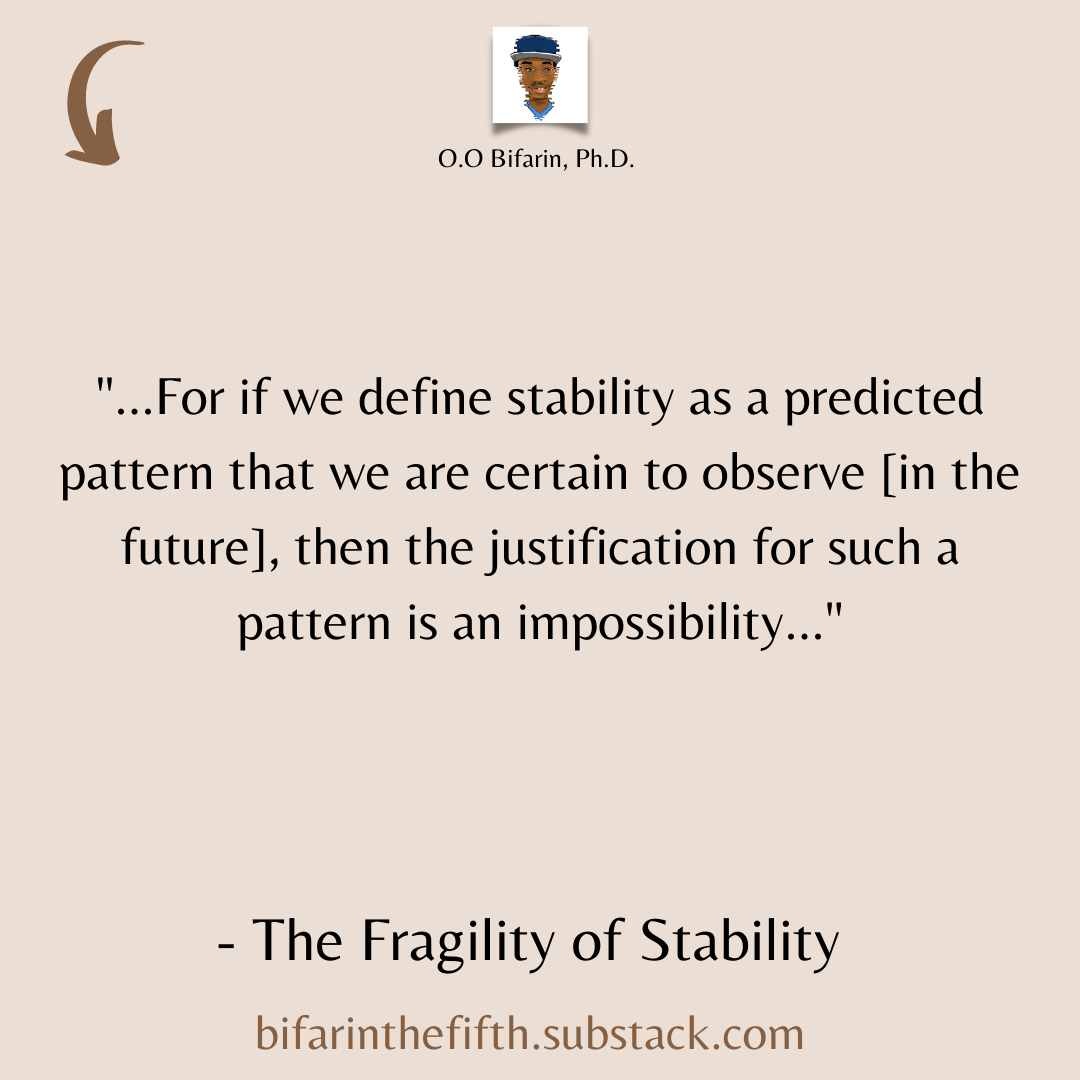[‘Housekeeping’: MBB grant volunteer reviewers have reported their results (thank you, reviewers!). Now I am (will be) contacting shortlisted individuals and teams for more information, a date for a chat, account information, and sundries. I will write a public post about winners later in January, February at the latest, God willing. Now, back to our essay. ]
Subject Area: Philosophy/Roman History
The 2 ways of knowing - Housekeeping and arguments - the adjectives were nowhere to be found - The p values that couldn’t save Billy - Respice post te. Hominem te memento - An epistemic meditation on the COVID-19 Pandemic - Writing as a manner of concluding
The 2 Ways of Knowing
Friends, permit me to start with Hume’s fork. He pontificated that there are two ways of knowing, what we call justified propositions: 1) matters of facts, and 2) relations of ideas. In the latter, he means logic, mathematics, proof, and everything in between – all bachelors are unmarried, Tilapia are fish, that kind of thing.
These statements are true by definition, and unfortunately, there is nothing we can do about that. This falls into the analytic arm of the analytic-synthetic distinction.
For the former, matters of facts, knowledge is derived from experience. Let me explain: If - after binge-watching, some nasty series on Netflix all night - you wake up at 11:37 am (now feeling very guilty, having wasted so much time); you carefully peeped out of your window, and you saw that the sun is shining.
If you see the sun shining, then it is the case that the sun is shining. You cannot wish the sun not to shine (or wish the time not to be 11:37 am). It is a brute fact about the world delivered by your experience. Alas, it is a matter of fact!
And there is yet another neat way to discriminate between these two ways of knowing. The negation of relations of ideas is impossible. So, for example, even if you want to, you cannot make yourself believe (or anyone for that matter) that all bachelors are not unmarried. But, on the other hand, the negation of a matter of fact is a fair game.
For example, it is not impossible for the sun to not shine. The sun can shine, and the sun cannot shine; there is no contradiction here. My readers should kindly bear this distinction in mind as we proceed to induction. It is the key to the famous problem of induction and our tool for meditating on all manner of things in this essay. I promise you; it will do a lot of work for us.
Housekeeping and Arguments
Before proceeding, let me define a couple of terms: inductive and deductive reasoning.
Argument I:
Hannibal Barca was an African (P1)All Africans are black (P2)Therefore, Hannibal Barca is black. (C)Given P1, if P2 is true, then it is the case that the beast himself, Hannibal Barca, was black. This is an example of deductive reasoning.
On the other hand, here is what inductive reasoning looks like:
Argument II:
All swans I have seen are white (P1b)Therefore, all swans are white (C*)Given P1b, then it is not necessarily the case that the conclusion is true. In other words, C* might be wrong. And why is that? You ask. More technically (using Hume’s fork), because C* cannot be a relation of idea; because its negation is not contradictory. That is, it is not impossible to have a different colored swan (the reader should contrast this with the contradiction of the proposition that all bachelors are not unmarried.)
To make matters worse, C* cannot be a matter of fact either. If it is snowing outside now, then it is the case that it is snowing outside. That is a matter of fact. But for C*, since we have not (and cannot) observed all swans in the world, then it cannot possibly be a matter of fact.
How then can we justify the conclusion ‘all swans are white’?
By thinking inductively: because it works, because that had been the case in the past! or something like that. Finally, and this is the brutal part: what proof do we have that the future will be like the past?
You might say because the past past had always been like the past future. But what you will be doing here is to use a principle (induction) to justify itself. Using a principle to justify the same principle, circularity par-excellence – what we can comfortably call an inductive circle.
The p Values That Couldn’t Save Billy
My maternal grandma was a very hands-on human being, very strong, and highly dutiful. I took lots of pleasure visiting her, especially when I was very young, particularly because of the rustic terrain, simple, unsophisticated, peaceful, that kind of thing. Also, she did almost everything: she was a petty trader who sold everything, and she reared some livestock at the side.
One of my favorites is the goat. Take one of the goats, say Billy. Billy got fed every day by my grandma (or one of my uncles), the goat roamed around the street every day and came back home to rest, get fed again, and on, and on. I can’t remember how long this roaming-around-getting-fed cycle was, but it went on for a very long time.
Now let’s unpack Billy’s epistemology. Say, you ask Billy its thoughts about what it knows and doesn’t know and the nature of the world. She might say something like this:
“I have this person (my grandma) who cares about me so much, who gives me a nice place to rest after roaming around, every day; I even get fed substantially every single day for f*** sake. What else do you want me to say except that life is good.” - Billy the Goat.
To Billy, this is perhaps like a law of nature, say gravity. This is brutal, but I will say it anyways, imagine you are Billy. The probability that Billy is in good hands increases drastically every day. (every day, the p-value drops.)
But the story changed on one cold Christmas eve when loads of family members cramped up my grandma’s house. How else could she entertain all these beautiful people, for God’s sake? She might have thought. And then a great idea came to mind; the goat meat will go around for sure!
So, a couple of guys with huge biceps in the family brought out some of the sharpest knives I have ever seen in my entire life. All they did was simple. They called out the goat for her usual morning food.
And then a very loud bleat followed. The epistemology of Billy was shattered within a twinkle of an eye. All the very low p values were nowhere to be found. Alas, the p values couldn’t save Billy. And yet, if Billy had paid close attention to Hume’s fork, he would have realized the lurking illusion of stability.
An Epistemic Meditation on the COVID-19 Pandemic
To be honest, it was soccer for me. I just wanted to play league soccer really bad. We went on recess in November of 2019, and to my surprise, by January 2020, my feet, particularly my hands, were already itching (as I am a goalie).
So, when a friend asked what I would be doing the next Sunday evening, without much thought, I told him about this nice league in town and that I would be there sweating, jumping, and playing my life away.
I must have transmitted my enthusiasm to him that he quickly added that he would love to join. I told him not that fast. It’s a pretty tough league, and he needs to think about it. He agreed and mentioned that perhaps he should watch our first game and then decide, as he is very, very rusty at the moment. I said that sounds good. He said it was good too. I smiled, he smiled, and we parted ways.
Except that when I was having the conversation with our dear friend, there was this coronavirus thing in China that was constantly bombarding my news feed. Most of the time, when I see it, I just clear my screen with that clear thingy on my iPhone.
I didn’t think much of it. And then, just like play, they said it was in Europe. And on, and on. And then they said a few folks were dying in the United States. And then schools closed. And then labs closed. And then restaurants closed.
For most people, it was a (bad) dream. Unprecedented isn’t apt enough. The ineffability of the event could be felt in the air as people searched helplessly for adjectives. As I write these words, perhaps at the beginning of the end of the pandemic, well over 5 million people have died of the virus.
All I wanted to do was play soccer, and here are people who would have plans for their lives (who would have their own soccer thingy going on), losing their jobs, and even worse: dropping dead.
While I will grant that the covid-19 pandemic isn’t a black swan but a grey rhino (simply because it is predictable and preventable); however, for a bloody civilian, an average joe, the coffee store attendant down the street, soccer referees, personal trainers, cobblers, professors, from a consequentialist perspective, we face the illusion of stability analogous to Billy’s.
(A side note: a black swan is a phrase used to describe a highly improbable event with huge impact; on the other hand, a grey rhino is a highly probable event (which makes it preventable) with likewise massive impact, but usually ignored. Given what we know about respiratory viral infections, pandemics, and globalization, the Covid-19 incidence indeed is a grey rhino. We can go into more interesting details about this, but we have a bigger fish to fry.)
Respice post te. Hominem te Memento
Today, many of us numb ourselves with entertainment and ‘goals’, amusing ourselves to death, except that the only thing that we fail to think about is death itself. However, this was not the case, at least for a wise Roman general who, they say, had a stand-by staff (some sort of a Roman slave)
But the point is: anytime he is victorious and praised, adored, worshipped on the streets of Rome, then the job of our dear friend kicks in. It’s easy-peasy: he holds a crown over the General’s head and just continually whisper to his ears (amidst all the great noise), saying the following:
Respice post te. Hominem te memento
“Look after you [to the time after your death] and remember you’re [only] a man.”
In some versions: Memento mori (remember you must die). Being healthy and enjoying popularity in human culture are addictive attainments, but one mustn’t forget the baggage that always comes after.
And our Roman General got the point: all the stability we see is an illusion, and hence, a much-needed constant reminder.
Boethius, the Don
Regarded as one of the last Roman philosophers and first of medieval theologians, Boethius – the author of the massive bestseller De Consolatione Philosophiae – is another who gets it. He was born around the time little Augustus (Flavius Romulus Augustus) was deposed as the last emperor of the Western Roman Empire, so let’s say circa 476.
Notably, he was one of those patricians with a story to tell. He belongs to the gens Anicia that – as far we know – produced two Western Roman emperors (Olybrius and Petronius Maximus) and many, many consuls. He lived well until he didn’t.
By 25, he was already a senator. He held many important positions under Theodoric the Great, the then king of the Ostrogoths. He did not only become a consul at circa 510; his two sons became co-consuls years later. Being a consul meant juggling many balls if we were to compare it to our modern times. It’s like acting as an advisor, judge, ambassador, in some capacities all at once.
At some point, 522, to be precise, he got the magister officiorum position. Something that sounds like the Chief of staff of the government to me. And what more? He was easily one of the most educated persons in the world at the time.
He is one of those dudes that do mathematics and philosophy in their leisure time. He authored textbooks on arithmetic and geometry, translated and did commentary on Aristotle’s logic and some of Porphyry’s work. In addition, he wrote his own textbook on logic and authored theological treatises.
Needless to say, Boethius was doing well: hopping from posts to posts, jumping from riches to power, and writing complicated books like it’s no man’s business.
So let’s count his blessing: successful marriage, great sons, hugely successful political career, and an intellectual par excellence. What else could he ask for? Probably nothing. And what could ever go wrong?
The answer, unfortunately, is everything! (i.e., Murphy’s law.)
This is what happened:
Actually, no one is sure about the backstory, but Boethius woke up one morning in prison in 523 waiting for his head to be chopped off for an offense he most likely did not commit.
There has been tension between the Eastern (Byzantium) and the Western arm of the Roman Empire. And somehow, Boethius got himself caught up in this east-west split of this day.
It started like this: a fellow named Cyprianus accused an ex-consul Albinus of conspiring with Justin I, the Eastern Roman emperor at the time. This event took place in the Royal council meeting in the city of Verona. Being the sophisticated guy he was, Boethius wanted to show some logical flaws in arguments. He decided to reply with a reductio ad absurdum, he said,
“the charge of Cyprianus is false, but if Albinus did that, so also have I and the whole senate with one accord done it; it is false, my Lord king.”
He was perhaps expecting a few nods, here and there, from the members of the councils followed by a thunderous clap. But he was wrong! Some historians believed it was a set-up because as Boethius finished his statements, witnesses were brought forward to corroborate that he, Boethius, committed treason. As a result, he was sentenced to death, but before that, he had a historical stopover at the prisons in Pavia.
In Pavia, he wrote his bestseller, De Consolatione Philosophiae: a very popular book in the middle ages. So many things happened in this book. First, it is one hell of a theological treatise showing once and for all, the illusion of stability and that the search for stability in this world is futile: having experienced it firsthand. Today he was a boss, the next minute, he was shell-shocked, wasting away in prison.
In the book, he utilized a fictional character called lady philosophy, who incessantly told him that he shouldn’t be surprised at what had happened to him and that she was shocked that he was shocked.
Lady philosophy drove the point via a powerful metaphor. Our fate is in the hand of the goddess Fortuna, the goddess of fate. On the one hand, she has a cornucopia flowing of fruits; on the other hand, a tiller.
When she smiles at you, you are fine. When she frowns, you are screwed. And what's more, there seems to be no logic, no regularity, no patterns to her emotions.
Here is Boethius, via Lady philosophy:
“I know the many disguises of that monster, Fortune, and the extent to which she seduces with friendship the very people she is striving to cheat, until she overwhelms them with unbearable grief at the suddenness of her desertion.”
Friends, this is a direct implication of Hume’s fork, except he is coming at it via the backdoor. So let’s take a look at it more closely.
(By the way, on 23rd October 523, Boethius was executed, and brutally so. He was 44 years old)
Writing as a Manner of Concluding
What is not particularly obvious is the amount of inductive-like arguments surrounding us. It’s present in our lives, in our plans, in our economy, in our kitchen, in the water we drink, the cloth we wear, and everywhere we look.
Hume, via his fork, showed that if a proposition cannot be shown to be a relation of idea or as a matter of fact, then it has to be relegated to a belief statement. Billy’s sight of the sharp knives, the pandemonium COVID-19 has caused (and still causing), the Roman General’s slave-staff and Boethius’s ordeal are evidence of our conflation of knowing and believing. And yet, we have to live as if we know, except that we can’t know.
And to be honest with you, as a clever reader might have noticed (and if we allow ourselves to be nit-picky), the title of this essay is slightly misleading. For we cannot be talking of the fragility of a thing that itself is an illusion, but even on this energetic winter morning, I am too lazy to change it, so I have decided to use it to our advantage.
When I started writing, I was going to make a case for the fragility of stability. However, as I write along, no matter how hard I try to weave the words, a case for fragility just couldn’t be made. For if we define stability as a predicted pattern that we are certain to observe, then the justification of such a pattern is an impossibility. And if it is an impossibility, the promise of stability goes through the window. It is not that it is fragile, it is that we have mistaken its semblance for the real thing.
At best, we are talking about the fragility of an illusion, and that is as awkward as it sounds. But here is where I put a stake into the ground: stability is a spiritual reality.






